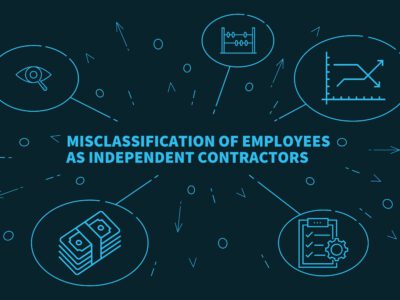BRIAN J GRABER LLC is an Employee Classification Act lawyer representing employees in the construction industry wrongfully classified as independent contractors in violation of the Employee Classification Act and employees retaliated against for insisting on their rights under the Employee Classification Act. Misclassification in violation of the Employee Classification Act, 820 ILCS 185/1, et seq., occurs when an employer treats its, construction workers, as “independent contractors” when its construction workers are really employees. The Employee Classification Act, 820 ILCS 185/3 is intended to address the practice of misclassifying construction employees as independent contractors.
Employers purposely misclassify their construction employees as independent contractors to avoid compliance with:
- Unemployment insurance;
- Worker’s Compensation;
- Minimum Wage and Overtime;
- Social Security;
- Tax withholding;
- Employee classification tax;
- Federal Taxes
The Employee Classification Act Applies to Construction Employees

The Employee Classification Act defines the term “performing services” as follows:
. . . means the perfromance of any constructing, altering, reconstructing, repairing, rehabilitiating, refinishing, remodeling, remediating, renovating, custom fabricating, maintenance, landscaping, improving, wrecking, painting, decordating, demolishing, and adding to or subtracting from any building, structure, highway, roadway, street, bridge, alley, sewer, ditch, sewage disposal plant, water works, parking facility, railroad, excavation or other structure, project, developement, real property or improvement herein described of any material or article of merchendise. Construction shall also include moving construction related materials on the job site to or from the job site.
Employee Classification Act, 820 ILCS 185/5.
The Employee Classification Act defines the term “construction” as follows:
. . . means any constructing, altering, reconstructing, repairing, rehabilitating, refinishing, remodeling, remediating, renovating, custom fabricating, maintenance, landscaping, improving, wrecking, painting, decorating, demolishing, and adding or subtracting from any building, structure, highway, roadway, street, bridge, alley, sewer, ditch, sewage disposal plant, water works, parking facility, railraod, excavation or other structure, project, developement, real property or improvement, or to do any part thereof, whether or not the performance of the work herein described involves the addition to, or fabrication into, any structure, project, developement, real property or improvment herein described of any material or article of mercendise. Construction shall also include moving construction related materials on the job site to or from the job site.
Employee Classification Act, 820 ILCS 185/5.
The Employee Classification Act defines the term “contractor” broadly as including a general contractor and a subcontractor as follows:
. . . means any individual, sole proprietor, partnership, firm, corporation, limited liability company, association or other legal entity permitted by law to do business within the State of Illinois who engages in construction as defined by this Act.
Employee Classification Act, 820 ILCS 185/5.
Based on these definitions, employees must be engaged in “performing services” in the “construction” industry to be entitled to the protections of the Employee Classification Act.
The Employee Classification Act Does Not Apply to the State of Illinois or the Federal Government.
Under the Employee Classification Act, 820 ILCS 185/5 “employer” means any contractor that employs individuals deemed employees under Section 10. The definition of “employer” expressly excludes the State of Illinois or its officers, agencies, or political subdivisions, or the federal government from coverage of the Employee Classification Act. See 820 ILCS 185/5.
The Employee Classification Act Presumes Individuals Perfroming Construction Are the Contractor’s Employees.
Under the Employee Classification Act, 820 ILCS 185/10(a), an individual performing services for a contractor is deemed to be an employee of the employer unless one of the exceptions in 820 ILCS 185/10(b) or (c) apply.
Under the Employee Classification Act, 820 ILCS 185/10(b) an individual performing services for a contractor is deemed to be an employee of the contractor unless it is shown that:
- the individual has been and will continnue to be free from control or direction over the perfromance of the service for the contgractor, both under the individual’s contract of service and in fact;
- the service perfromed by the individual is outside the usual course of services perfromed by the contractor; and
- the individual is engaged in an independently established trade, occupation, profession or business; or
- the individual is deemed a legitimate sole proprietor or partnership under subsenction (c) this Section.
Under the Employee Classification Act, 820 ILCS 185/10(c) the sole proprietor or partnership performing services for a contractor as a subcontractor is deemed legitimate if it is shown that:
- the sole proprietor or partnership is perfroming the service free from the direction or control over the means and manner of providing the service, subject only to the right of the contractor for whom the service is provided to specify the desired result;
- the sole proprietor or partnership is not subject to cancellation or destruction upon severance of the relationship with the contractor;
- the sole proprieter or partnership has a substantial investment of capital in the sole properitership or partnership beyond ordinary tools and equipement and a personal vehicle;
- the sole proprietor or partnership owns the capital goods and gains the profits and bears the losses of the sole proprietorship or partnership;
- the sole proprietor or partnership makes its services available to the general public or the business community on a continuing basis;
- the sole proprietor or partnership includes services rendered on a Federal Income Tax Schedule as an independent business or profession;
- the sole proprietor or partnership perfroms services for the contractor under the sole propritership’s or partnership’s name;
- when the services being provided require a license or permit, the sole proprietor or partnership obtains and pays for the license or permit in the sole proprietorship’s or partnership’s name;
- the sole proprietor or partnership furnishes the tools and equiopment necessary to provide the service;
- if necessary, the sole proprietor or partnership hires its own employees without contrator approval, pays the employees without reimbursement from the contractor and reports the employees’ income to the Internal Revenue Service;
- the contractor does not represent the sole proprietorship or partnership as an employee of the contractor to its customers; and
- the sole proprietor or partnership has the right to perfrom similar services for others on whatever basis and whenever it chooses.
Under the Employee Classification Act, 820 ILCS 185/20 it is a violation for an employer or entity not to designate an individual as an employee under 820 ILCS 185/10 unless the employer or entity satisfies the provisions 820 ILCS 185/10 (b) and (c) described above.
If you believe that your employer violated your rights under the Employee Classification Act by improperly classifying you as an independent contractor, contact BRIAN J GRABER LLC an Employee Classification Act lawyer at (312) 291-4648 or by email for a free confidential consultation.
Employees Misclassified as Independent Contractors Can File a Lawsuit or An Administrative Complaint with the IDOL.
Under the Employee Classification Act, 820 ILCS 185/25(a) an employee misclassified as an independent contractor can file an administrative complaint with the Illinois Department of Labor (IDOL). The IDOL will be responsible for investigating any alleged violation of the Employee Classification Act. Click here to file an electronic complaint with the IDOL. Click here for an ECA paper complaint form. Complaints filed with the IDOL need to be mailed to the following address: Illinois Department of Labor, 524 South 3nd St, Suite 400, Springfield, IL 62701. The IDOL can be contacted at the following number: (217) 782-1710.
Under the Employee Classification Act, 820 ILCS 185/60(a) an employee aggrieved by a misclassification as an independent contractor in violation of the Act may file a lawsuit in the circuit court without regard to exhaustion of administrative remedies and seek the following damages:
- the amount of any wages, salary, employment benefits, or other compensation denied or lost to the person by reason of the violation, plus and an equal amount in liquidated damages;
- compensatory damages and an amount up to $500.00 for each violation of the Act or any rule adopted under this Act;
- Attorney’s fees and costs.
The Employee Classification Act contains a statute of limitations that states as follows:
The right of an interested party or aggrieved person to bring an action under this Section terminates on the passing of 3 years from the final date of perfroming services to the employer or entity. This limitations period is tolled if an employer or entity has deterred a person’s exercise of rights under this Act.
Employee Classification Act, 820 ILCS 185/60(b).
If you believe that your employer violated your rights under the Employee Classification Act by improperly classifying you as an independent contractor, contact BRIAN J GRABER LLC an Employee Classification Act lawyer at (312) 291-4648 for a free confidential consultation.
Employee Classification Act Retaliation Claims
Under the Employee Classification Act, 820 ILCS 185/55(a) it is a violation for an employer or entity, or any agent of an employer or entity, to retaliate through discharge or in any other manner against any person for exercising any rights granted under this Act. Under 820 ILCS 185/55(a) retaliation subjects an employer or entity to civil penalties pursuant to this Act or a private cause of action, or both.
BRIAN J GRABER LLC is an Employee Classification Act retaliation lawyer representing employees retaliated against for exercising their rights under the Employee Classification Act. If you believe that your employer retaliated against you in violation of your rights under the Employee Classification Act, contact BRIAN J GRABER LLC an Employee Classification Act retaliation lawyer at (312) 291-4648 or by email to schedule a free confidential consultation.

Protected Activity for Retaliation Claims
The Employee Classification Act, 820 ILCS 185/55(b) makes it a violation of Illinois law for an employer or entity to retaliate against a person for engaging in any of the following protected activities:
- making a complaint to an employer or entity, to a co-woker, to a community organization, before a public hearing, or to a State or federal agency that rights guarenteed under this Act have been violated;
- causing to be instituted any proceeding under or related to this Act; or
- testifying or preparing to testify in an investigation or proceeding under this Act.
If you believe that you were retaliated against by your employer for engaging in protected activity under the Employee Classification Act, contact BRIAN J GRABER LLC an Employee Classification Act Retaliation lawyer at (312) 291-4648 or by email to schedule a free confidential consultation.
Remedies and Statute of Limitations for Retaliation Claims

Under the Employee Classification Act, 820 ILCS 185/60(a)(3) and (4) in the case of unlawful retaliation, a person whose rights have been violated is entitled to all legal and equitable relief as may be appropriate and attorney’s fees and costs.
The Employee Classification Act contains a statute of limitations that states as follows:
The right of an interested party or aggrieved person to bring an action under this Section terminated on the passing of 3 years from the final date of perfroming services to the employer or entity. This limitation period is tolled if the employer or entity has deterred a person’s exercise of rights under this Act.
Employee Classification Act, 820 ILCS 185/60(b).
Retaliation claims under the Employee Classification Act may also lead to claims for wage & Hour retaliation claims. Click here to learn more about Illinois Wage & Hour retaliation claims.
BRIAN J GRABER LLC is an Employee Classification Act retaliation lawyer representing employees retaliated against for engaging in protected activity under the Employee Classification Act. If you believe your employer retaliated against you for engaging in protected activity under the Employee Classification Act, contact BRIAN J GRABER LLC an Employee Classification Act retaliation lawyer at (312) 291-4648 or by email to schedule a free confidential consultation.
